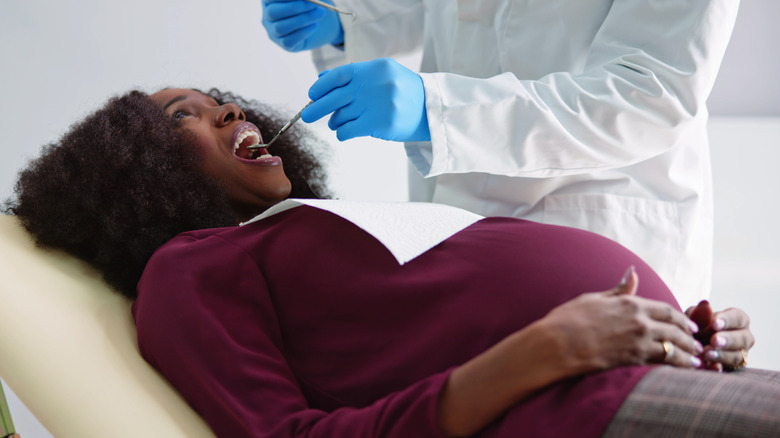
Pregnancy impacts the body in numerous and unexpected ways. From morning sickness to significant emotional fluctuations and physical discomforts, carrying a baby is no simple feat. To add to the array of changes the body undergoes during pregnancy, you may also notice a shift in your teeth. Surprisingly, your teeth might actually move.
“During pregnancy, women experience substantial hormonal changes, particularly increased levels of estrogen and progesterone,” explained Ashley Boling, DDS, practice owner at Aspen Dental, in a conversation with NCPIC. She noted that these hormonal changes can loosen the ligaments and bones that help keep teeth in place. “These changes make the body more reactive to bacteria, increasing the likelihood of gum inflammation and making teeth more susceptible to shifting,” she added.
While not everyone will experience tooth movement during pregnancy, it is a possible side effect of hormonal fluctuations, and it’s something you should be aware of to avoid unexpected surprises during your pregnancy.
How to Prevent Teeth from Moving During Pregnancy

While it’s impossible to completely prevent teeth from moving, there are steps you can take to minimize any movement. First, avoid common oral care mistakes. “Aim to brush your teeth twice daily with fluoride toothpaste for at least two minutes each time, and remember to floss daily to remove food particles between your teeth,” advised Boling. She also mentioned that drinking water throughout the day helps maintain oral cleanliness and health.
Pregnancy can be a challenging time for many, making it difficult to maintain a routine. Some may also struggle with a sensitive gag reflex or tender gums. If this is the case, don’t cease brushing, as there are alternatives available. “If brushing is uncomfortable, try using a toothbrush with a smaller head or opt for a toothpaste that foams less,” Boling suggested. “If flossing proves difficult, consider using a water flosser as a gentler alternative.” The key is to keep your mouth as clean as possible to minimize teeth shifting and ensure your baby’s health through good oral hygiene.
What to Do If Your Teeth Move During Your Pregnancy

If you notice your teeth shifting during pregnancy, your first step should be to consult with a dentist or orthodontist. Depending on the extent of the shift, you may need aligners, or if the movement is significant, braces might be necessary. It’s essential to seek professional advice to determine the best course of action. “If gum issues are present, your dentist might recommend deep cleanings or other treatments to maintain gum health,” Boling noted. “Regular checkups and maintaining good oral care are crucial to preserving your smile after pregnancy.”
While teeth movement is a common occurrence during pregnancy, it doesn’t mean it will happen to you. The best approach for you and your baby is to prioritize oral hygiene. If orthodontic care becomes necessary, address it when the time comes. For now, focus on brushing at least twice daily and staying hydrated with plenty of water.




